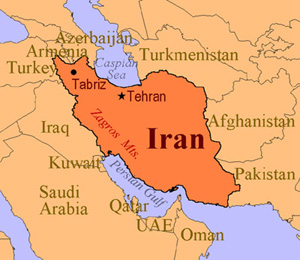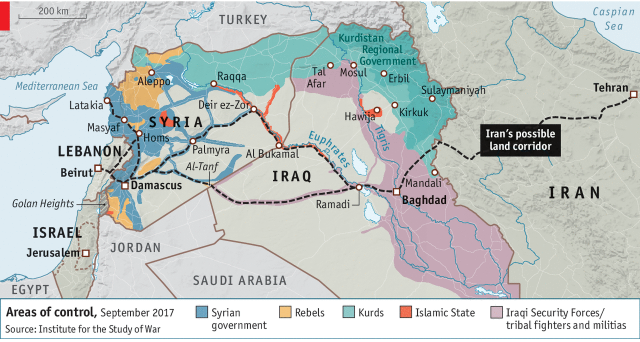Does Trump Want Iran to Become Another North Korea?
President "decertifies" the six-nation anti-nuclear pact Oct 19 2017It was one of his campaign promises — to get rid of "one of the worst negotiated deals of any kind that I have ever seen". Itching to end it, but having acquiesced twice in the past, the president has this time decertified the nuclear stand down agreement with Iran. When did Donald Trump's "base" ever ask for this promise, as well as the long list of hostile actions he will now have the U.S. take against the Islamic Republic?
His national security team has strongly recommended that he keep the U.S. in the 
accord. In a statement in September, over 80 disarmament experts urged him to honor the U.S. pledge, calling the agreement a "net plus for international nuclear nonproliferation". The IAEA (International Atomic Energy Agency) nuclear inspectors on site in Iran declared that their latest inspections found no breach of the agreement, no grounds for decertification. All five partner nations that negotiated the deal along with the U.S. — Britain, China, France, Germany and Russia — do not want to renegotiate what is working.
But Donald Trump will have none of it. After all, isn't the JCPOA (Joint Comprehensive Plan of Action) another of Barack Obama's successes on Trump's demotion list? Based on nothing, no violations, he said as he grudgingly recertified a second time back in July, "If it was up to me I would have had them noncompliant 180 days ago". The president now complains, "They are not living up to the spirit of the agreement. I can tell you that". There was no "spirit of the agreement". The JCPOA is an arms control agreement, nothing more.
In accepting the pact with Iran, Congress passed legislation that requires the president to recertify every 90 days that Iran continues to be in compliance with the agreement. Upon decertification, Congress has 60 days to decide whether to restore the sanctions — the suspension of which was the quid pro quo for Iran's taking a number of steps to halt its nuclear program. Trump can claim that by decertifying he has done his part to fulfill his pledge to the voters who never asked for this, but he has made it clear that if Congress does not reimpose sanctions, he will cancel U.S. participation in the accord outright.
The protocol imposed restrictions on Iran to halt their development of a nuclear bomb at a point where experts believed success was only months away. The agreement only postpones their achieving that goal. It hobbles the effort for 10 years — 15 for some aspects. It does not end it. It buys time during which the Obama administration — notably the president himself and then-Secretary of State John Kerry — wistfully thought a more moderate regime might take hold in Iran.
The accord does not stop Iran's other adventuring. The troublesome nation has continued to advance its missile program. It has supported terrorist organizations, backed the Houti rebellion in Yemen. Its militias have been fighting ISIS in Iraq, which it has turned into a dependent state, reliant on Iran for all its needs other than oil, its stores stocked with goods made in Iran. It has always supported Bashar al-Assad in the Syrian civil war, the 
From The Economist
country being a pathway to Lebanon, where Iran funds and provides a formidable arsenal of weapons and rockets to Hezbollah, which is surely building toward another far more powerful attack on Israel. Thus has Iran laid down a virtual easement of control all the way to the Mediterranean.
The deal's detractors presume Iran is cheating. The accord allowed Iran to refuse access to its major Parchin military complex, which gave rise to the suspicion that nuclear work continues there. The agreement mothballed two-thirds of the country's 19,000 centrifuges, leaving behind only older, less capable models, but allowed continued research and development of centrifuges still more advanced than those sitting in storage. Ambassador Haley has said that Iran is guilty of "multiple violations" of the JCPOA, but with no basis in fact. (It is in violation of U.N. resolution 2231 that calls upon Iran to forgo work on “ballistic missiles designed to be capable of delivering nuclear weapons”. Does she know the difference?) Former ambassador to the U.N., John Bolton, in a Wall Street Journal op-ed, warns that, "Even U.S. intelligence could be in the dark if Iran is renting a uranium enrichment facility under a North Korean mountain".
Those opposed to the deal have been particularly incensed by its calling for the return to Iran of their own funds frozen by the West when the shah was overthrown in the revolution of 1979. When the agreement was signed, the total was spoken of as from $100 billion to $150 billion, with the fear that this will fund the country becoming the hegemon of the region and potentially making it invulnerable to sanctions. However, the amount looks to be far less. The Washington Free Beacon, which, as a far right group, has an interest in painting the worst case, comes up with only $33.6 billion that had been transferred as of a year ago. Given his views, it is unlikely that President Trump has authorized any transfers since.
Those calling for renegotiation ask why the original agreement didn't rein in all of Iran's provocations, but that was never on the table, and was certainly never offered. The accord never contemplated going any further than being an arms control agreement limited to nuclear weapons. When Donald Trump called the deal "an embarrassment" in July, he had evidently lost sight of that limitation. The U.S. wanted the deal, wanted to stop Iran's onrushing development of a weapon, and to get that result had to make concessions. Iran had 19,000 centrifuges spinning when the talks began and an enriched stockpile already in hand. The "breakout" time — how soon they could further enrich enough to make a bomb — was estimated at a mere 2-3 months. That's what the JCPOA put a halt to. And today, Iran has indicated that, if sanctions are restored, they will pick up where they left off.
Iran's extracurricular mischief must be dealt with separately — blacklisting companies with Revolutionary Guard ownership (reportedly 20% of the valuation of the Tehran stock exchange), sanctions on companies and individuals involved with Iran's missile program, and Mr. Trump just announced those steps as part of his decertification address. But it makes no sense to cancel the one restraint already in place, doubling the Iranian problem by creating a second intractable nuclear aspirant to deal with.
Forgotten is how difficult it was to arrive at a deal. The talks took a grudging 20 months, punctuated by disputes and walkouts and needing repeated deadline extensions as negotiators fought over final terms and language. The Iranian negotiators showed an unyielding resolve to hold out unless one after another concession was granted. The concern on our side of the table was that they would quit the talks.
The other concern was that, absent a deal, there were signs the sanctions would soon fall apart. Both Britain's and Germany's ambassador to the U.S. had warned that the sanctions would probably erode were the pact to fail. Former CIA director James Woolsey thought "the sanctions regime is slipping; the world is tired of these sanctions".
Which tells us that if the U.S. Congress goes along with Trump's decertification and votes to restore the sanctions, the five partner nations will not follow suit. They are already prospering, cutting deals with and selling goods to Iran. There will be no appetite to cancel this new opportunity and "snap back" the sanctions, which is what had been threatened should Iran cheat. Iran knows this, knows that Trump will find himself odd man out, as with so much else at home and abroad.
Iran has already said renegotiation would mean that every concession Iran made would be back on the table. Iran's Foreign Minister Javad Zarif asks, "Are you prepared to return to us 10 tons of enriched uranium", the nuclear fuel Iran shipped to Russia as part of the agreement, about 98% of what it had produced? Iran President Hassan Rouhani shut the door more firmly:
"There's absolutely no returning to negotiations. This deal is not something anyone can touch. It's like a building. If you pull one brick the entire structure will collapse".
Mattis said in his confirmation hearing in January that "when America gives her word, we have to live up to it", but we now have Ambassador Haley saying about decertification at the U.N.:
"This is about U.S. national security. This is not about European security. This is not about anyone else."
That left the five nations that laboriously worked out the Iran accord alongside us stunned.
The North Koreans have already seen Trump abandon TPP (Trans-Pacific Partnership), the 12-nation alliance for trade, and drop out of the Paris Accord, in which virtually all the nations of the world vow to cut carbon emissions, so withdrawing from the JCPOA tells the North Koreans what they already know: the U.S. cannot be trusted.
Trump's answer to it all is expressing a desire to increase the U.S. nuclear arsenal tenfold in violation of the rest of our arms control agreements.
Please subscribe if you haven't, or post a comment below about this article, or
click here to go to our front page.

